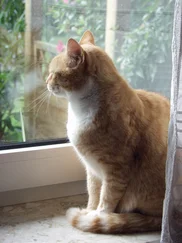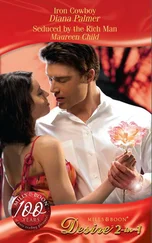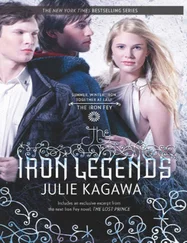I made to climb into the ambulance after it; one of the attendants even took my arm to help me in; but a policeman intervened. 'Wait, we'll send another ambulance for her,' he said,
'I don't want another ambulance,' I said. He put on a kindly, nonplussed look. 'I want to go with him,' I said, and made another attempt to climb in. The quilt fell to my feet.
He shook his head, 'No,' he said. He gestured and the attendant closed the doors.
'God forgive us!' I breathed. With the quilt clasped, around me I began to walk down Schoonder Street, away from the crowd. I had almost reached the corner when the policewoman came trotting after me. 'You must come home now!' she ordered. 'It's not my home any more,' I replied in a, fury, and kept walking. She took my arm; I shook myself free. 'Sy's van haar kop af,' she remarked to no one in particular, and gave up.
In Buitenkant Street, under the flyover, I sat down to rest. A steady stream of cars flowed past heading for the city. No one spared me a glance. With my wild hair and pink quilt I might be a spectacle on Schoonder Street; here, amid the rubble and filth, I was just part of the urban shadowland.
A man and woman passed on foot on the other side of the street. Did I recognise the woman? Was it the one Vercueil had brought to the house, or did all the women who hung around the Avalon Hotel and Solly Kramer's Liquor Store have those wasted, spidery legs? The man, carrying a knotted plastic bag over his shoulder, was not Vercueil.
I wrapped myself tighter in the quilt and lay down. Through my bones I could feel the rumble of traffic on the flyover. The pills were in the house, the house in other hands. Could I survive without the pills? No. But did I want: to survive? I was beginning to feel the indifferent peace of an old animal that, sensing its time is near, creeps, cold and sluggish, into the hole in the ground where everything will contract to the slow thudding of a heart. Behind a concrete pillar, in a place where the sun had not shone for thirty years, I curled up on my good side, listening to the beat of the pain that might as well have been the beat of my pulse.
I must have slept. Time must have passed. When I opened my eyes there was a child kneeling beside me, feeling inside the folds of the quilt. His hand crept over my body. 'There is nothing for you,' I tried to say, but my teeth were loose. Ten years old at most, with a shaven skull and bare feet and a hard look. Behind him two companions, even younger. I slipped out the teeth. 'Leave me alone,' I said: 'I am sick, you will get sick from me.'
Slowly they withdrew and, like crows, stood waiting.
I had to empty my bladder. Yielding, I urinated where I lay. Thank God for the cold, I thought, thank God for the numbness: all things work together toward an easy birth.
The boys came closer again. I awaited the prying of their hands, not caring. The roar of wheels lulled me; like a grub in a hive, I was absorbed into the hum of the spinning world. The air dense with noise. Thousands of wings passing and repassing without touching. How was there space for them all? How is there space in the skies for the souls of all the departed? Because, says Marcus Aurelius, they fuse one with another: they burn and fuse and so are returned to the great cycle.
Death after death. Bee-ash.
The flap of the quilt was drawn back. I felt light on my eyelids, coldness too on my cheeks where the tears had run.
Something pressed between my lips, was forced between my gums. I gagged and pulled away. All three children were clustered over me now in the gloom; there may have been others too, behind them. What were they doing? I tried to push the hand away but it pressed all the harder. An ugly noise came from my throat, a dry rasp like wood splitting. The hand withdrew. 'Don't -' I said; but my palate was sore, it was hard to form words.
What did I want to say? Don't do that!? Don't you see I have nothing?? Don't you have any mercy?? What nonsense. Why should there be mercy in the world? I thought of beetles, those big black beetles with the humped backs, dying, waving their legs feebly, and ants pouring over them, gnawing at the soft places, the joints, the eyes, tearing away the beetle-flesh.
It was a stick, nothing more, a stick a few inches long that he had forced into my mouth. I could taste the grains of dirt it left behind.
With the tip of the stick he lifted my upper lip. I pulled back and tried to spit. Impassively he stood up. With a bare foot he kicked, and a little rain of dust and pebbles struck my face.
A car passed, outlining the children in its headlights. They began to move off down Buitenkant Street. Darkness returned.
Did these things really happen? Yes, these things happened. There is no more to be said about it. They happened a stone's throw from Breda Street and Schoonder Street and Vrede Street, where a century ago the patricians of Cape Town gave orders that there be erected spacious homes for themselves and their descendants in perpetuity, foreseeing nothing of the day when, in their shadows, the chickens would come home to roost.
There was a fog in my head, a grey confusion. I shivered; paroxysms of yawning passed over me. For a while I was nowhere.
Then something was sniffing at my face: a dog. I tried to ward it off but it found a way past my fingers. So I yielded, thinking, there are worse things than a dog's wet nose, its eager breath. I let it lick my face, lick my lips, lick up the salt of my tears. Kisses, if one wanted to look at them that way.
Someone was with the dog. Did I recognize the smell? Was it Vereueil, or did all street-wanderers smell of mouldering leaves, of underwear rotting in the ash-heap? 'Mr Vereueil?' I croaked, and the dog whined with excitement, giving a great sneeze straight into my face.
A match flared. Yes, it was Vercueil, hat and all. 'Who put you here?' he asked. 'Myself,' I said, past the raw place on my palate. The match died. Tears came again, which the dog eagerly consumed.
With his high shoulderblades and his chest narrow as a gull's, I would not have guessed that Vereueil could be so strong. But he lifted me, wet patch and all, and carried me. I thought: forty years since I was last carried by a man. The misfortune of a tall woman. Will this be how the story ends: with being carried in strong arms across the sands, through the shallows, past the breakers, into the darker depths?
We were away from the flyover, in blessed stillness. How much more bearable everything was suddenly becoming! Where was the pain? Was the pain in a better humour too? 'Don't go back to Schoonder Street,' I ordered.
We passed under a streetlight. I saw the strain in the muscles of his neck, heard his breath coming fast. 'Put me down for a minute,' I said. He put me down and rested. When would the time come when the jacket fell away and great wings sprouted from his shoulders?
Up Buitenkant Street he bore me, across Vrede Street, street of peace, and, treading more slowly, groping before each step, into a dark wooded space. Through branches I glimpsed the stars.
He set me down.
'I am so happy to see you,' I said, the words coming from my heart, heartfelt. And then: 'I was attacked by some children before you came. Attacked or violated or explored, I don't know which. That is why I talk so strangely. They pushed a stick into my mouth, I still don't understand why. What pleasure could it have given them?'
'They wanted your gold teeth,' he said. 'They get money for gold from the pawnshops.'
'Gold teeth? How strange. I haven't any gold teeth. I took my teeth out anyway. Here they are.'
From somewhere in the dark he fetched, cardboard, a carton box folded flat. He spread it and helped me to Me down. Then without haste, without ceremony, he lay down too with his back to me. The dog settled between our legs.
Читать дальше












